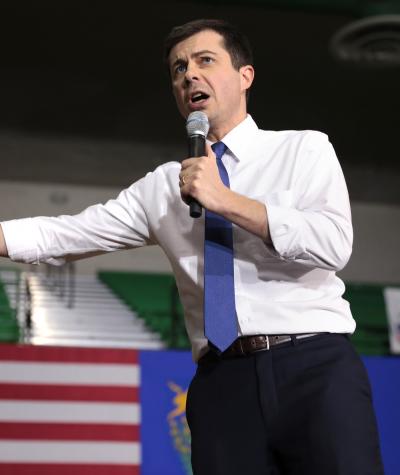Campaign Legal Center (CLC) has filed a complaint with the Federal Election Commission (FEC) alleging that Pete Buttigieg’s presidential campaign committee and the super PAC VoteVets violated the law by unlawfully coordinating up to $639,000 in ad spending in advance of the Nevada caucus.
On February 5, 2020, a senior Buttigieg campaign official tweeted, “Pete’s military experience and closing message from Iowa work everywhere especially in Nevada where it’s critical they see this on the air through the caucus.”
One week later, VoteVets—the only super PAC supporting Buttigieg’s campaign at the time, and the only group that could reasonably be expected to follow through on the “critical” request—aired over $639,000 in broadcast ads in Nevada, slated to run through the caucus, touting “Pete’s military experience” and highlighting the theme of unity that Buttigieg had used as his “closing message” in the final stretch of the Iowa caucus.
As a result, VoteVets illegally made, and the Buttigieg campaign illegally accepted, over $639,000 in “coordinated communications:” the Buttigieg campaign requested and suggested that the super PAC VoteVets buy television broadcast ads in Nevada highlighting specific campaign themes, and VoteVets followed through on that request.
Although there is an exception from certain coordination rules if a super PAC obtains material from a publicly available source, the FEC expressly declined to extend this “publicly available” exception to ads that are created and distributed at the “request or suggestion” of a candidate or his agent.
Buttigieg has pledged to reform our political system, but at the same time, his campaign is not only embracing big money super PACs, but illegally inviting their support. The FEC’s failure to enforce its own coordination rules in the decade since Citizens United, coupled with the agency’s recent lack of a quorum, has encouraged super PACs and candidates from both parties to find new ways to work together. But the Buttigieg campaign’s obvious and detailed request for super PAC support, even when made publicly, crosses a legal line.
Federal law limits coordination because a candidate’s campaign may only be funded by contributions of up to $2,800 per individual, whereas a super PAC can accept unlimited and corporate contributions. Coordinating with a big money-funded super PAC allows a candidate to sidestep contribution limits: if a super PAC is operating at the direction of the campaign, then six-figure donations to the super PAC pose just as much risk of corruption and undue influence as six-figure donations to the candidate himself.
